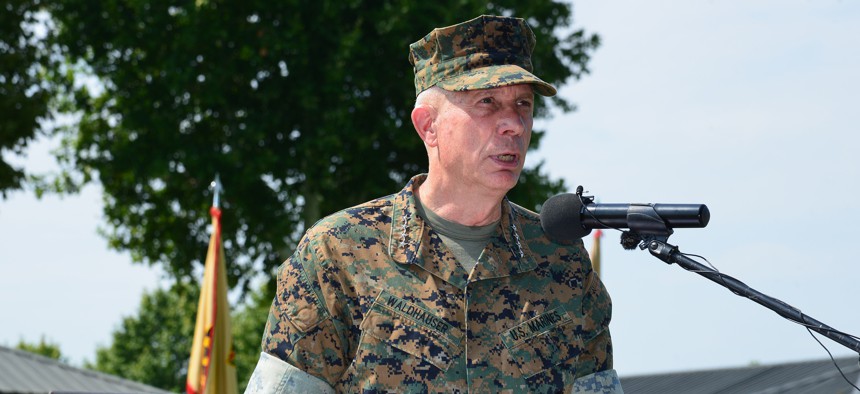
Marine Corps, Gen. Thomas D. Waldhauser, commander of the U.S. Africa Command, delivers remarks in Italy in August. Paolo Bovo/Army
AFRICOM Commander: Elite Troop Cuts Won’t Help China, Eyes Shift To Conventional Forces
“It’s really a misleading narrative to say that optimization is causing us to walk away from Africa,” Gen. Waldhauser said in an interview.
The Trump administration’s planned U.S. troop reduction in Africa over the next two years will be minimal and won’t undercut the United States’ ability to counter China and Russia, according to the commanding general of U.S. Africa Command. But adding conventional forces would help U.S. efforts to build up local militaries and signal to them that America is a better long-term partner than Beijing, he said.
AFRICOM will remove fewer than 130 special operations troops across the continent by June 2020, according to Gen. Thomas Waldhauser.
“I think it’s important not to conflate the optimization [of counterterrorism forces] and great power competition,” Waldhauser said in an interview. “Where we’re training counterterrorism forces, it’s not that the Chinese are going to come in tomorrow and backfill that. It’s really a misleading narrative to say that optimization is causing us to walk away from Africa.”
A second tranche of cuts — part of an overall 10-percent reduction slated to take place by late 2021 — might not even happen, he suggested.
“Whether that’ll ever happen or not, I don’t know,” he said. “Each of these decisions to adjust force posture will be taken one at a time.”
Pentagon officials announced in November they would cut about 10 percent of the roughly 7,200 Defense Department personnel currently assigned to Africa Command, as the United States to seeks to shift its strategic focus from counterterrorism to countering competitors like China and Russia. The reductions were part of a broader effort to alleviate some of the strain on special operations forces across the globe, Waldhauser said. The Joint Staff determined that the military could reduce forces and “absorb some risk” in Africa because some of the terror groups that the U.S. was working with local forces to counter, although affiliated with al Qaeda or ISIS, “might not necessarily be a risk to the homeland.” Although the department is planning to cut 10 percent of its forces, only about half of those are special operators — “trigger pullers,” Waldhauser said. The overall number also includes conventional forces supporting special operations missions.
The administration’s decision to cut troops in Africa raised some eyebrows because China is expanding its footprint on the continent — partly via its sweeping infrastructure program called the Belt and Road Initiative, and partly by building on decades of financial and political involvement in several countries. Senate Armed Services Committee lawmakers last week repeatedly pressed Waldhauser on China’s influence across the continent, and whether its activities represented “a beginning of a militarization process that presents a global threat or an expansion of a threat from China.”
Alice Friend, who specializes in African security issues at the Center for Strategic and International Studies, or CSIS, said that the Defense Department hasn’t done a good job explaining how AFRICOM is dealing with Chinese and Russian influence on the continent. The command’s argument — that cutting counterterror forces won’t impact the execution of the new strategy — is a hard swallow for some lawmakers and analysts. National Security Advisor John Bolton unveiled a new strategy for Africa in December that emphasized increased economic development as the primary means to counter Russian and Chinese influence, but he offered little detail and the military strategy remained unchanged. Some critics argue that the drawdown will allow Russia and China to fill the void left by U.S. troops.
“I think people would buy it more if we understood what they were doing for China and Russia. Most of the public rhetoric right now admires the problem,” she said. “But the answer might be that the administration doesn’t believe great power competition [in Africa] has any defense implications at all.”
“That would strengthen the argument that optimization and great power competition don’t have anything to do with one another.”
China in Africa
Senior AFRICOM leaders are cautious not to describe China’s activities in Africa as a “militarization,” but acknowledge that Beijing has a sustained and formidable presence on the continent. “At this point in time, it’s too early to make that leap,” Waldhauser told the committee. China has around 2,000 peacekeepers and 300,000 civilians on the continent, he noted, “so they want to be able to protect their interests and projects they’re working on.”
AFRICOM’s Brigadier General Leonard Kosinski, director for logistics, was unsurprised by the desired shift of focus from counterterrorism to China and Russia. Beijing opened its first overseas military base in Djibouti, near the U.S. base Camp Lemonnier, and it participates in peacekeeping operations across the continent. In September, China invited over 50 heads of state from African nations to Beijing, where Chinese President Xi Jinping rolled out billions of dollars in grant and loan programs.
“China and Russia — we’ve known, in Africa, that they’ve been there for a while,” Kosinski said in an interview. “But as far as militarizing and finding bases pop up through the continent — that’s not the case.”
Waldhauser is concerned about keeping open U.S. maritime access to Africa. China, he notes, is not the only country that is working to secure port access on the Red Sea and the Bab el-Mandeb Strait—“the Russians, the Emiratis, the Saudis are all interested in real estate on the African side,” he told lawmakers. He expects China also will seek access to Cape Verde and Senegal on the west coast, because of their relatively stable governments and deep water ports, which he called “a concern for us because they could be in the Atlantic Ocean rather quickly.”
“Djibouti is not the first, and it won't be the last port,” Waldhauser said. “And the growth of their military on the continent, I don't know what it will turn out to be, but I do know that the Chinese... made a conscious decision to start there, and they're not going to get smaller.”
A call for conventional forces
“China has been there for quite some time and they have worked at this relationship,” Waldhauser acknowledged. “What we try to do from the AFRICOM or DOD perspective is try to show that we are the best partner — the type of training we give them, the weapons perhaps that are sold by the United States have high quality and try to make sure that our influence remains.”
“It's a difficult task,” he said.
Waldhauser told lawmakers that AFRICOM is under-resourced—a known complaint from a regional command that claims far less public or governmental attention than the wars in the Middle East. Lawmakers and former officials for years have warned that the U.S. has relied too heavily on elite special operators in Africa for short-term tactical missions that aren’t underpinned by a holistic strategy or complemented by non-military efforts.
He told lawmakers that what “we really need... are some predictable general purpose forces that can do things with regular armies on a somewhat episodic but yet predictable basis.”
To that end, Senate Armed Services Chairman Jim Inhofe, R-Okla., has pushed for the Army to assign a Special Force Assistance Brigade, or SFAB, in Africa. SFABs are new, specialized Army units pulled from conventional Army ranks to train and assist partner forces abroad.
“You can take it as you want,” Waldhauser told Defense One. But, he said, “if we had some conventional forces, there’s plenty of work that could be done. We would be able to train regular armies. That probably wouldn’t be heel-to-toe but at least we would be able to assist [partner forces].” In Nigeria, for example, Waldhauser said that Army components train with local battalions for a couple of months—“and this is just one way to try to improve a conventional unit….which in many places is needed.”
The request suggests a shift in how U.S. forces have approached Africa in the past, from a series of short-term counterterrorism operations to a more permanent mission to help build militaries. The number of U.S. strikes in Somalia on al-Shabaab fighters has skyrocketed since 2016. Special Operations Command Africa has over a thousand troops advising local forces fighting a variety of terrorist groups in about a dozen countries. Maj. Gen. James Hecker, the Joint Staff’s vice director for operations, told the House Armed Services Committee last week that the military plans to “place even greater emphasis” on a particular funding program known as 127e, which lets the U.S. direct surrogate forces “to achieve U.S. [counterterrorism] objectives at relatively low cost in terms of resources and especially risk to our personnel.”
But “building good counterterrorism forces is not the same thing as building good militaries,” said CSIS’s Friend. “So if the theory of the case for Africa Command is that one of the things we’re doing to help stabilize [African nations] is build strong professional militaries, that’s different from SOF rotating in and out and teaching direct-action skills.”
“What I hear [Waldhauser] saying is that he wants assigned forces to AFRICOM, not just rotational SOF forces,” she said.
Greater numbers of conventional forces could help backfill the cuts to elite operators and alleviate concerns about staying focused on the great power priorities of the president’s National Defense Strategy.
“Given the emphasis on improving the capabilities of conventional forces across all of the U.S. armed forces, they can perform tasks now that, maybe five or ten years ago could only be accomplished by SOF,” retired Gen. Carter Ham, president and CEO of the Association of the United States Army and former commander of AFRICOM, said in an email. He called Waldhauser’s proposal “spot-on.”
But beyond presenting itself as “a better partner,” questions still remain about how, exactly, the U.S. military will seek to counter China in Africa.
“What [China’s] aspirations are militarily and how much training will be involved [to respond] is something that will be determined down the road,” Waldhauser said.







